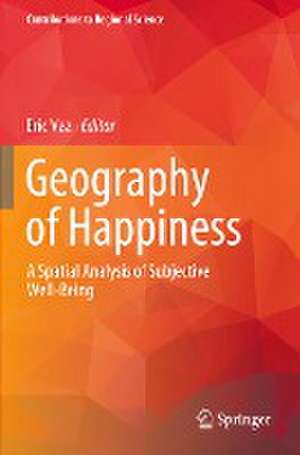Geography of Happiness: A Spatial Analysis of Subjective Well-Being: Contributions to Regional Science
Editat de Eric Vazen Limba Engleză Paperback – 22 feb 2024
The book proposes a multidisciplinary approach and is intended for scholars and students in the fields of geography, economics and the spatial sciences. By examining several critical dimensions of happiness and subjective well-being, it enriches the complexity of regional decision-making on the path toward happier and more liveable societies.
| Toate formatele și edițiile | Preț | Express |
|---|---|---|
| Paperback (1) | 724.83 lei 38-44 zile | |
| Springer International Publishing – 22 feb 2024 | 724.83 lei 38-44 zile | |
| Hardback (1) | 945.14 lei 43-57 zile | |
| Springer International Publishing – 21 feb 2023 | 945.14 lei 43-57 zile |
Preț: 724.83 lei
Preț vechi: 953.72 lei
-24% Nou
Puncte Express: 1087
Preț estimativ în valută:
138.69€ • 145.20$ • 114.76£
138.69€ • 145.20$ • 114.76£
Carte tipărită la comandă
Livrare economică 02-08 aprilie
Preluare comenzi: 021 569.72.76
Specificații
ISBN-13: 9783031198731
ISBN-10: 3031198735
Pagini: 176
Ilustrații: VI, 176 p. 34 illus., 24 illus. in color.
Dimensiuni: 155 x 235 mm
Ediția:2023
Editura: Springer International Publishing
Colecția Springer
Seria Contributions to Regional Science
Locul publicării:Cham, Switzerland
ISBN-10: 3031198735
Pagini: 176
Ilustrații: VI, 176 p. 34 illus., 24 illus. in color.
Dimensiuni: 155 x 235 mm
Ediția:2023
Editura: Springer International Publishing
Colecția Springer
Seria Contributions to Regional Science
Locul publicării:Cham, Switzerland
Cuprins
Chapter 1. Happiness Geography: Defining the field (Eric Vaz).- Part I. Regional Challenges.- Chapter 2. A Spatial Analysis of the Instagram hashtag #happy: An assessment of Toronto (Eric Vaz).- Chapter 3. The subjective well-being in North Africa and the impacts on agriculture and urban land (Azzeddine Bellout).- Part II. Territorial Challenges.- Chapter 4. Researching quality of life in old age: some conceptual and methodological principles (Jose Sao Jose).- Chapter 5. Peripheral retail expansion: social implications and spatial inequalities The case of the Île-de-France region (André Torre).- Part III. Location Challenges.- Chapter 6. Sustainable Cities, Quality of Life and Mobility-Related Happiness (Karima Kourtit).- Chapter 7. Tourism, Climate Change and Wellbeing: The Products’ Diversity as an Opportunity (Andre Samora-Arvela).- Chapter 8. Tourism, Senses and Well-being.
Notă biografică
Eric Vaz is a tenured Professor at Ryerson University, Canada. He serves as the President of the Canadian Regional Science Association. His research chiefly focuses on the interaction of regional science with geographic analysis in the Anthropocene.
Textul de pe ultima copertă
This book offers readers a spatial understanding of happiness and subjective well-being. By integrating spatial and geostatistical methods, it sheds new light on the spatial and geographical aspects of subjective well-being. Geographical analysis allows us to measure spatial and regional discrepancies in subjective well-being and to identify heterogeneous profiles in terms of social, economic and environmental patterns. Consequently, the papers gathered here address various topics concerning the spatial aspects of subjective well-being, including social injustice, age, new urban spaces, and tourism.
The book proposes a multidisciplinary approach and is intended for scholars and students in the fields of geography, economics and the spatial sciences. By examining several critical dimensions of happiness and subjective well-being, it enriches the complexity of regional decision-making on the path toward happier and more liveable societies.
The book proposes a multidisciplinary approach and is intended for scholars and students in the fields of geography, economics and the spatial sciences. By examining several critical dimensions of happiness and subjective well-being, it enriches the complexity of regional decision-making on the path toward happier and more liveable societies.
Caracteristici
Provides the foundation for a new multidisciplinary field Examines spatial and geographical aspects of subjective well-being Combines perspectives from positive psychology with subjective well-being, regional science, and economics


